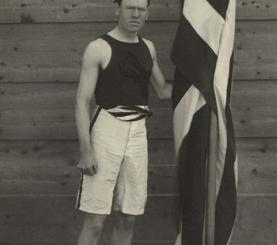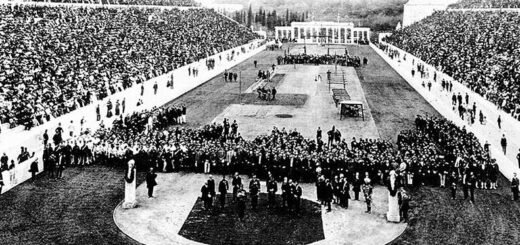Modern Olympics: Timeline
The modern Olympics, a grand revival of the ancient games, have become one of the most significant global events, bringing together athletes from around the world to compete in a wide range of sports.
In the article below, WHE provides a comprehensive timeline of the modern Olympics, detailing key moments and milestones that have shaped the games from their inception in the late 19th century to the present day.
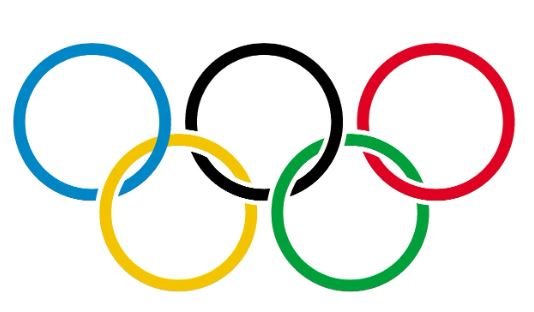
The modern Olympics have evolved significantly since their revival in 1896, reflecting broader social, political, and technological changes. Image: the Olympic rings.
Early Beginnings and the Revival
1896 – Athens, Greece
The modern Olympics were revived by Pierre de Coubertin, a French educator who was inspired by the ancient Greek tradition. The first modern Olympics were held in Athens, Greece, in 1896. The event featured 241 athletes from 14 countries competing in 43 events. The games were a success and established the Olympics as a major international sporting event.
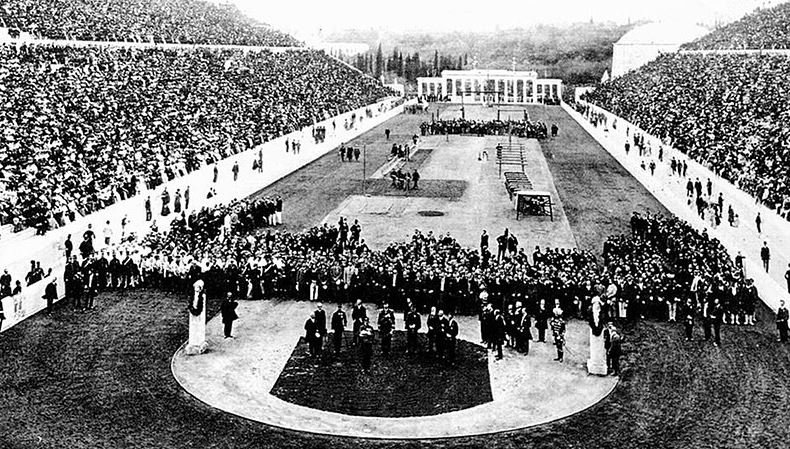
Image: The maiden edition of the modern Olympic games was held in Athens, Greece. The opening ceremony of the games took place at the Panathinaiko Stadium, seen in this image.
1900 – Paris, France
The second modern Olympics were held in Paris, coinciding with the 1900 Exposition Universelle (World’s Fair). The games were spread over five months and included new sports such as rowing, golf, and rugby. Women participated for the first time, competing in tennis and golf.
1904 – St. Louis, USA
The 1904 Olympics were held in conjunction with the Louisiana Purchase Exposition. The games were marred by logistical issues and a lack of international participation, with many events dominated by American athletes.
The Establishment of the Modern Olympic Movement
1906 – Intercalated Games, Athens, Greece
Although not officially recognized by the International Olympic Committee (IOC), the 1906 Intercalated Games in Athens were significant for revitalizing the Olympic movement. These games attracted broader international participation and helped to restore interest in the Olympics.
1908 – London, United Kingdom
The 1908 Olympics were initially awarded to Rome but moved to London due to the eruption of Mount Vesuvius. These games were notable for the introduction of standardized marathon distance (26 miles 385 yards) and the first use of a separate opening ceremony.
1912 – Stockholm, Sweden
The 1912 Stockholm Olympics saw the introduction of electronic timing devices and the first use of a public address system. The games featured 2,408 athletes from 28 countries and marked the debut of modern pentathlon.
Interwar Period and Growth
1920 – Antwerp, Belgium
The 1920 Olympics were held in Antwerp as a symbol of recovery following World War I. The Olympic flag with its five rings was introduced, representing the unity of the five continents.
1924 – Paris, France
The 1924 Paris Olympics saw the introduction of the Olympic motto, “Citius, Altius, Fortius” (Faster, Higher, Stronger). These games were the first to feature an athletes’ village and were the setting for the famous film “Chariots of Fire.”
1928 – Amsterdam, Netherlands
The 1928 Amsterdam Olympics were notable for the debut of the Olympic flame, which was lit during the opening ceremony. Women’s athletics and gymnastics were included for the first time.
The Rise of the Winter Olympics
1924 – Chamonix, France
The first Winter Olympics were held in Chamonix, France, in 1924. Initially known as “International Winter Sports Week,” the event featured sports such as skiing, ice hockey, and figure skating. The success of the Chamonix games led to the establishment of the Winter Olympics as a regular event.
The Impact of World War II
1936 – Berlin, Germany
The 1936 Berlin Olympics were marked by the political context of Nazi Germany. These games were used by Adolf Hitler to promote his regime. Jesse Owens, an African-American athlete, won four gold medals, challenging Nazi racial ideology.
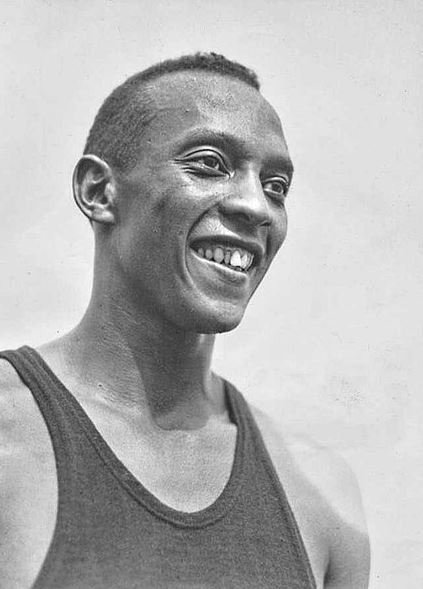
Image: Owens during the 1936 Olympic games.
Reasons why these countries and individuals boycotted the 1936 Berlin Olympics
1940 and 1944 – Cancelled
The 1940 and 1944 Olympics were canceled due to World War II. The planned 1940 games were initially awarded to Tokyo but were moved to Helsinki before ultimately being canceled. The war significantly disrupted international sporting events.
Post-War Era and Expansion
1948 – London, United Kingdom
The 1948 London Olympics, known as the “Austerity Games,” were held in a war-ravaged city with limited resources. Despite these challenges, the games were a success, marking a revival of the Olympic spirit. The games featured 4,104 athletes from 59 countries.
1952 – Helsinki, Finland
The 1952 Helsinki Olympics were notable for the first participation of the Soviet Union and other Eastern Bloc countries, setting the stage for Cold War rivalries. The games also saw the debut of the People’s Republic of China.
1956 – Melbourne, Australia
The 1956 Melbourne Olympics were the first to be held in the Southern Hemisphere. Due to quarantine regulations, the equestrian events were held separately in Stockholm, Sweden. The games were marked by several political boycotts related to the Suez Crisis and the Soviet invasion of Hungary.
The Era of Television and Globalization
1960 – Rome, Italy
The 1960 Rome Olympics were the first to be fully covered by television, bringing the games into homes around the world. These games saw the emergence of new athletic stars, such as Ethiopian runner Abebe Bikila, who won the marathon running barefoot, and American boxer Cassius Clay (later Muhammad Ali).

Muhammad Ali competed in boxing at the 1960 Summer Olympics held in Rome, Italy. He fought in the light heavyweight division and won the gold medal in that category. This victory marked the beginning of his illustrious career in boxing, during which he became one of the most famous and influential athletes in the sport’s history. Image: This picture of Ali was taken in 1967.
1964 – Tokyo, Japan
The 1964 Tokyo Olympics were the first to be held in Asia and were a showcase of Japan’s post-war recovery. These games saw the introduction of judo and volleyball as Olympic sports and were notable for the debut of satellite broadcasting.
1968 – Mexico City, Mexico
The 1968 Mexico City Olympics were marked by significant social and political events, including the Tlatelolco massacre just days before the opening ceremony. The games were notable for the high altitude, which impacted athletic performance, and the Black Power salute by American athletes Tommie Smith and John Carlos during the medal ceremony.
1972 – Munich, Germany
The 1972 Munich Olympics were overshadowed by the tragic terrorist attack known as the Munich massacre, in which 11 Israeli athletes and coaches were killed by the Palestinian group Black September. The games continued after a brief suspension, with American swimmer Mark Spitz winning seven gold medals.
Political Tensions and Boycotts
1976 – Montreal, Canada
The 1976 Montreal Olympics were marked by a boycott by several African nations protesting New Zealand’s sporting ties with apartheid South Africa. The games were financially challenging for the host city, leading to significant debt. Romanian gymnast Nadia Comăneci scored the first perfect 10 in Olympic gymnastics history.
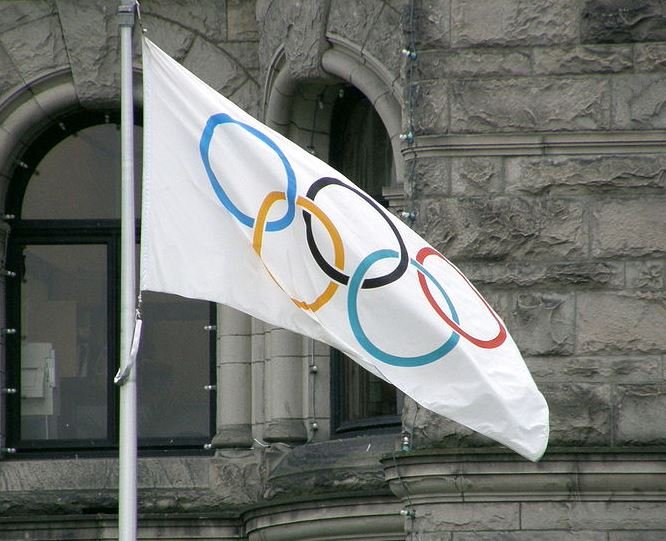
Image: A picture of the Olympic flag in Victoria, British Columbia, Canada.
1980 – Moscow, Soviet Union
The 1980 Moscow Olympics were boycotted by the United States and several other countries in protest of the Soviet invasion of Afghanistan. Despite the reduced participation, the games featured memorable performances, including Soviet gymnast Alexander Dityatin winning eight medals.
1984 – Los Angeles, USA
The 1984 Los Angeles Olympics saw a retaliatory boycott by the Soviet Union and its allies. Despite this, the games were financially successful, with substantial corporate sponsorships and a strong performance by American athletes, such as Carl Lewis, who won four gold medals in track and field.
Modernization and Commercialization
1988 – Seoul, South Korea
The 1988 Seoul Olympics marked a return to full participation after the boycotts of the previous two games. These games featured the introduction of table tennis and tennis as Olympic sports. The games were notable for the doping scandal involving Canadian sprinter Ben Johnson, who was stripped of his gold medal.
1992 – Barcelona, Spain
The 1992 Barcelona Olympics were widely praised for their organization and cultural impact. These games were notable for the “Dream Team,” the United States basketball team featuring NBA stars like Michael Jordan and Magic Johnson. The games also saw the participation of a unified Germany and the post-apartheid South Africa.
The Professional Era
1996 – Atlanta, USA
The 1996 Atlanta Olympics, marking the centennial of the modern games, were notable for commercialism and logistical issues. Despite these challenges, the games featured memorable moments such as the dramatic victory of American gymnast Kerri Strug and the participation of Muhammad Ali in lighting the Olympic flame.
2000 – Sydney, Australia
The 2000 Sydney Olympics were praised for their organization and spirit. These games saw the debut of triathlon and taekwondo. Notable moments included Australian swimmer Ian Thorpe’s performance and Cathy Freeman’s victory in the 400 meters, symbolizing reconciliation with the Aboriginal community.
2004 – Athens, Greece
The 2004 Athens Olympics returned to the birthplace of the ancient games. Despite initial concerns about preparations, the games were successful and featured the debut of women’s wrestling and the return of the marathon to its historic route.
The New Millennium and Technological Advancements
2008 – Beijing, China
The 2008 Beijing Olympics were a grand spectacle, showcasing China’s rise as a global power. The games featured remarkable performances, such as Michael Phelps winning eight gold medals in swimming and Usain Bolt breaking world records in sprinting. The Beijing Olympics were notable for their impressive opening ceremony and technological advancements.
2012 – London, United Kingdom
The 2012 London Olympics were celebrated for their organization, sustainability initiatives, and cultural impact. These games saw the debut of women’s boxing and memorable moments such as British cyclist Bradley Wiggins’ victory and the performances of American gymnast Gabby Douglas and Jamaican sprinter Usain Bolt.
2016 – Rio de Janeiro, Brazil
The 2016 Rio Olympics faced numerous challenges, including political instability, economic issues, and concerns about the Zika virus. Despite these difficulties, the games featured notable achievements, such as Michael Phelps’ retirement with a record 23 gold medals, Simone Biles’ dominance in gymnastics, and Usain Bolt’s third consecutive gold medals in the 100m and 200m.
Recent Developments and Challenges
2020 – Tokyo, Japan (Held in 2021)
The 2020 Tokyo Olympics were postponed to 2021 due to the COVID-19 pandemic, marking the first time the games were rescheduled in peacetime. The games were held without spectators and featured strict health protocols. Despite these unprecedented circumstances, the Tokyo Olympics showcased remarkable performances, including the debut of sports like skateboarding, sport climbing, and surfing. Athletes like American gymnast Simone Biles highlighted mental health issues, bringing significant attention to the pressures faced by elite athletes.
2024 – Paris, France
The 2024 Paris Olympics is set to mark the 100th anniversary of the 1924 Paris games. Paris is focusing on sustainability and inclusivity, with plans to use existing venues and promote gender equality. The games are expected to feature new sports like breakdancing and continued efforts to address environmental concerns.
2028 – Los Angeles, USA (Upcoming)
The 2028 Los Angeles Olympics will return to a city with a rich Olympic history, having previously hosted the games in 1932 and 1984. The LA28 games aim to be innovative and youth-focused, leveraging the city’s technological and entertainment industries to enhance the Olympic experience.

